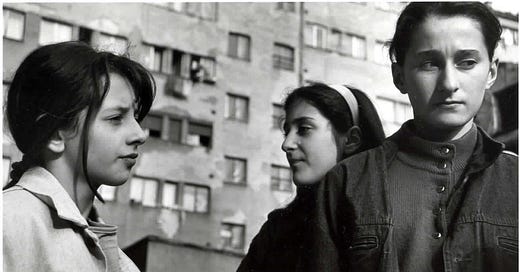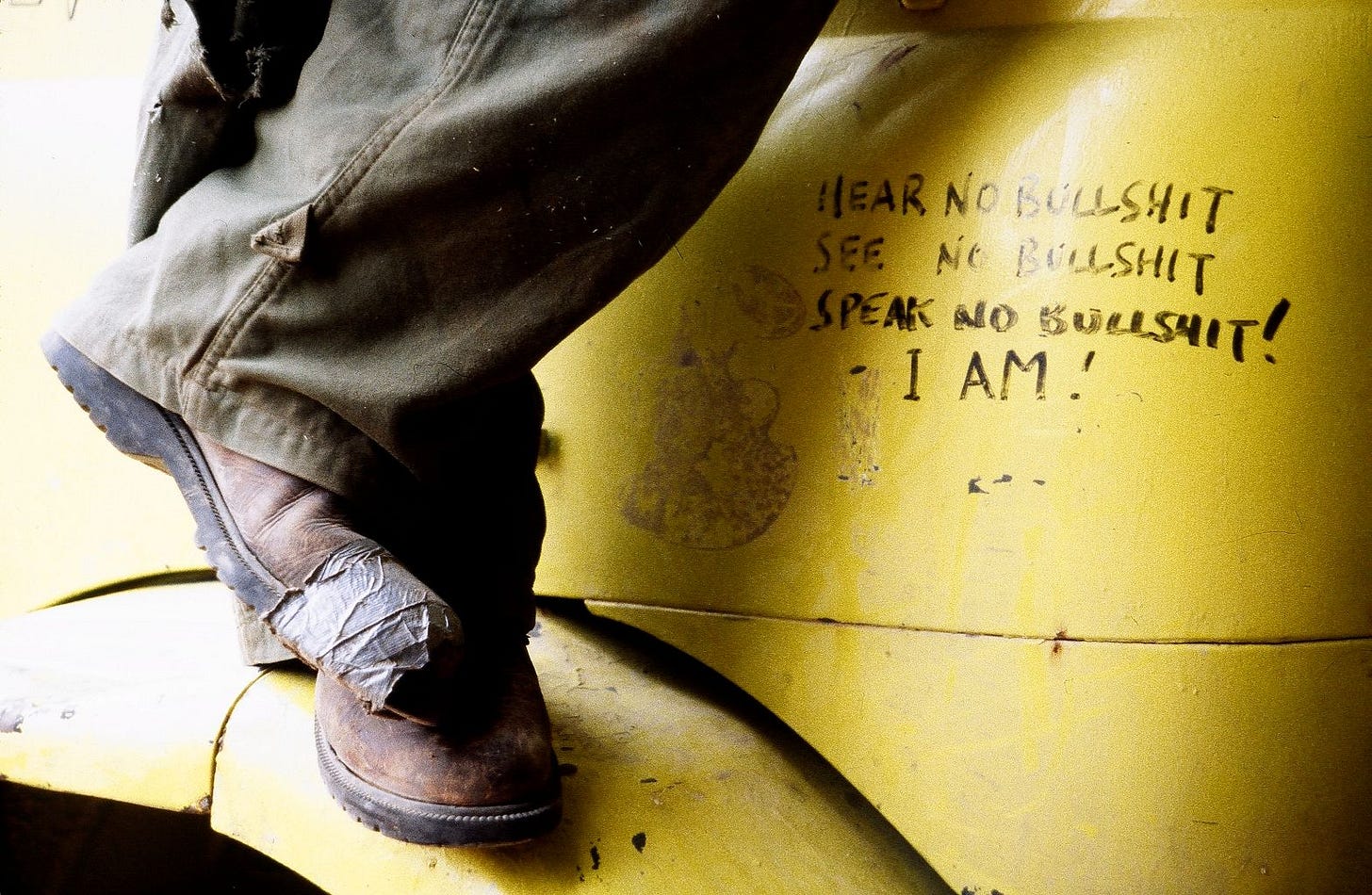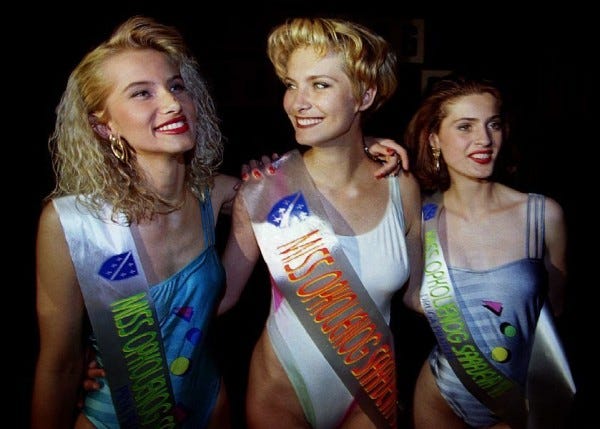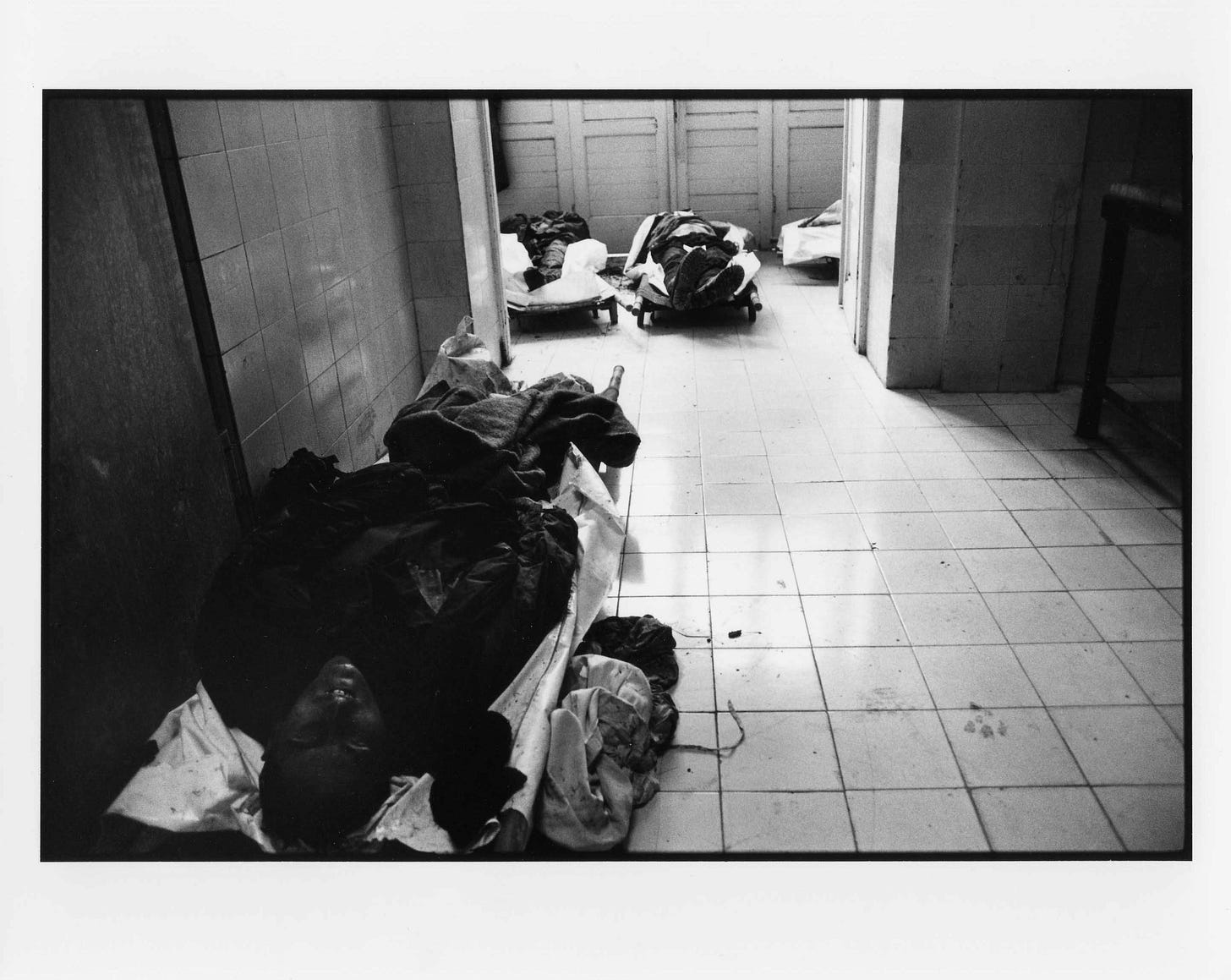XIX. Miss (you) Sarajevo, ep. 2
Interview with Bill Carter, director in the besieged capital city of Bosnia in 1993. Collaborating with the U2, he brought people's voices from Sarajevo across Europe and made the song possible
Hi,
welcome to the first English version of BarBalkans. This is an Italian newsletter and its aim is to give a voice to the Western Balkans’ stories, on the 30th anniversary eve of the Yugoslav Wars.
Last Saturday, we started a journey to approach the 25th birthday of “Miss Sarajevo”, the famous song by the U2 and Luciano Pavarotti.
We talked about the architectural soul of the Bosnian capital city, the aim of the siege during the Bosnian War and the concept of “urbicide”.
You’ll find soon the first episode translated in English, I promise.
Today, we’ll continue this trip/trilogy and we’ll discover one of the greatest “behind the scenes” of this masterpiece.
Bill Carter, the writer, the director, the man who made all of this possibile, has just entered the BarBalkans.
Let’s all be silent.
Bill has the floor.
Should I stay or should I go
Bill, it’s a pleasure to meet you. Tell us what happened in 1993: why were you in Sarajevo?
“The truth? For me, this question is kind of twofold. Why did I go? And why did I stay?
The first answer: I was probably trying to fill a hole in me, something that I had lost. I haven’t been comfortable talking about it for a very long time.
I was in Croatia, already a pretty seasoned backpacker, but I had no money. I just wanted to help. It was just instinct, I didn't really know what I was doing.
The energy was legitimate, because I was honest. I left, but I couldn't even find anybody, an organization, to accept my help!
In the end, I found The Serious Road Trip. It was a very practical experience, we delivered food. And by helping people, I became a friend of them”.
And then?
“Why did I stay? It’s easy. Because when you are in a situation like that, you have to decide quickly: am I going to be useful?
If you just want to watch, you’re a tourist during a war. And if you have any soul, that’s very bad. On the contrary, if you open your eyes while you're useful, everything changes.
Meanwhile, I saw a lot of horrible things, I had terrible experiences. I realized I could have done more. I had bought a camera in Croatia: I needed to record everything I was seeing”.
What did you have in mind?
“I didn’t have the idea to make a movie. This was before Final Cut or Adobe Premiere, making a movie would have cost and I didn't have any money.
All I was doing was recording, almost like an archivist, an ethnograper. I was doing it to bear witnesses to that war. Slowly, things started to take shape.
And, of course, it all changed when I met the U2”.
It’s a trap!
Now we can talk about it. How did you manage to meet the U2?
“That’s a good story!
I saw the U2 in a TV station and they talked about a “united Europe”. It was ridiculous: the Balkans were on fire at the time!
I grew up with the U2, so I thought: «Well, they’re Irish, they have a good solid foot in the idea of ethnic and religious tension and how it can be manipulated for war. I’ve to get in touch with them».
I knew they would never talk to me, because I was no one.
I asked the editor of a television station, who I knew, to give me a piece of paper with their letterhead. It took me about a week to fax it.
Basically, what I did was playing scam.
I wrote them that I was the editor of the TV station and that we’d have liked to interview them, because of the upcoming concert in Bologna, Italy. But “I” couldn’t do it because, as a Muslim, I’d have been killed at the checkpoint.
However, we had an associate, Bill Carter, who could come out and do the interview”.
And it worked?
“Yes! They responded that they would have loved to do it. Bono didn’t realize I wasn’t Bosnian, until I was actually speaking to him on camera.
Once he realized it, we established a real connection: he understood that something was different in Sarajevo.
And that’s when the conversation actually started. That night we sat until 3 a.m. talking about how to do something.
It was a very frank conversation. I told them that money wouldn’t have solved the problem.
We had to infiltrate people’s minds in Europe. I didn’t know how to do that.
Bono said: «We will come to Sarajevo and play». Yeah, that would have been great, but everybody would have died.
That’s when I thought of the satellite”.
What do you mean?
“Well, video linkups to keep them safe all over Europe, starting from Italy. But, at the same time, to bring Sarajevo into Europe.
During the Zoo TV Tour, in Milan, Rome or other European cities, in the middle of the show the U2 linked-up with me and just… boom! I introduced Sarajevans on the screen.
We let them talk to the Europeans, who could understand that Bosnians were just human beings, maybe their own age.
Choosing people became my job. And it was hard. Because a lot of people were angry. But we wanted honest voices inviting Europe in.
For those who had the chance to talk about their stories, that experience was like getting high. At that time, isolation in Sarajevo was extreme, anything from the outside world would have been overwhelming.
But putting the concert in their ears and connecting them to tens of thousands of people, it blew their minds. Because they realized it was really happening in their lives. And it was magical!”
Movie and lyrics
That’s how they supported your movie “Miss Sarajevo”, too?
“When we had that chat, the idea of making a movie came instantaneously. «You can make it with our studio in Ireland», they said. I was shocked, I didn’t even know what that meant. Since then, everything was possible.
Meanwhile, I met Alma, the young girl. That hour I met her face to face is the thread of the movie. The moment I was recording her, I realized that I had a story. She’s the soul of the documentary.
Later on, when I was editing the movie in Dublin, in the U2 studios, I was fresh out of the war, so I was not in the best mind. I wanted it a bit surreal, with humor, because the dark stuff was going to come through.
And then Bono told me: «Call the documentary “Miss Sarajevo” and I’ll write you the song». Well, that was a no brainer! «Of course I’m going to call it “Miss Sarajevo”», I said.
I recognize the same idea that the whole city, the whole country was fighting for something that they were unwilling to give up: believing themselves, living with each other, no matter the ethnic group”.
Let’s go back to the song.
“I had no good titles, when Bono came up with this “Miss Sarajevo”.
I’ll be honest. I was against it because I felt it very “poppish”.
But he promised me a song that would have carried emotional weight into the movie. So, I accepted. It didn’t feel right, for a month or two. Actually, until I filmed Alma: after then, I could see her being Miss Sarajevo.
And then Bono sang me the song over the phone…
«Wow that’s amazing! It works, I wouldn’t change this title for anything else», I told him. I thought that “Miss Sarajevo” was a great metaphor for Bosnia, Alma and that kind of defiance of the beauty contest.
I’ve learnt this about Bono over the years: he’s very good at capturing the moments in a couple of words, in a song or in a title”.
Can you describe “Miss Sarajevo” using three words?
“It’s a poetic song, you can be moved only by the lyrics. It’s timely, because it captured the spirit of that time.
And it’s beautiful. I mean, come on, rock and roll and opera, they’re not brother and sister genres! But yes, it worked perfectly!”
Resisting beauty
What do you think about the beauty contest, that inspired this title?
“The day in which the beauty pageant happened was a really intense bombing day in Sarajevo. It didn’t make any sense to have a beauty contest in a moment like that.
At the same time, it made perfect sense. In a sort of Dadaistic and surreal way, which is sometimes a characteristic of Sarajevo and of the western Balkans in general.
Moreover, the sign “Don’t let them kill us” was very powerful.
In the movie I interviewed a woman who explained what was behind that event. She said something people usually don’t think about or they’re afraid to say it out loud:
«The beauty of women in the Balkans is pretty well known. But we see it as a form of defense, our own way of fighting».
It was very hard to organize a beauty pageant during a war, especially that kind of war, where the entire city was under siege. They couldn’t get anything, but they fought even for it.
The beauty contest is what people remember. But, for me, the truth is that “Miss Sarajevo” evoked the spirit of the city: «We’re going to survive». Even with beauty”.
Your most touching experience in Sarajevo?
“Well, the idea of the sharing.
There was a time when I lived with a family and I was very close to two sisters. Every time I came back, we sat together and we had a meal with a chicken, carrots and onion. They were the most amazing meals of my life.
And for them too. When I went back to Sarajevo in 2018, everybody still talked about these meals. We shared even only one chicken with many people, but we were all together”.
And the most terrible one?
“I saw a lot of horrible things: people dying, arms blown off, the hospitals.
But the most emotional thing was the other side of the “sharing” coin. People often shared the last thing they had: the last can of tuna, the last cup of coffee, just to spend some time talking.
Once, a friend of mine told me about the story of a man who lived with his family in downtown Sarajevo, with his children and their kids: twelve people in the same house. He was the eldest.
You have to know that every home in Sarajevo had a “safe room”. Actually, it wasn’t really safe, but safer from a sniper’s shot than the other rooms.
One day, the whole family was in the house and the man wanted to make coffee for everyone. His children told him not to go in the kitchen. It wasn’t safe. But he went there anyway.
When he was in the kitchen, a bomb came through a little window in the “safe room”. It killed everybody. But not him. Now he’s alive, with no family, just because he wanted to share a “last” coffee.
Sarajevo is like a walking wound. Everything is under the surface. A horrible, lingering, haunting, alive and still visible memory of things”.
Pit stop. Sittin’ at the BarBalkans
We’ve arrived at the end of the second episode, approaching the 25th anniversary of “Miss Sarajevo”. It’s time for a pause.
It may seem unbelievable, but even someone who lived under a siege may have something to suggest at our bar, the BarBalkans.
Just listen to him, before he gets back on the road.
Bill, back to 1993.
“I spent a lot of time having a coffee, a tea, a beer. I have a lot of cafés in my mind, with so many people who maybe I had never met before having that coffee together.
Bosnians are the most inviting people and Sarajevans are very accommodating: they’re born hosts, they want to meet you, talk to you, know your story.
You can stay in New York City for nine years and no one talks to you, unless to yell at you. In Sarajevo, if you meet someone and they like you, your whole week is planned!
And they would immediately ask you: «Coffee?» That’s what you would drink every second in Sarajevo!
Even when people around you are “playing war”. Or making war for real”.
Now c’mon, let’s continue the BarBalkans journey. We’ll meet again in a week, for the third and last episode of this trip/trilogy…
A big hug and have a good journey!
«Is there a time
for keeping your distance,
a time to turn your eyes away.
Is there a time
for keeping your head down,
for getting on with your day»- “Miss Sarajevo”
Passengers (U2 & Pavarotti) -
I thank you from the bottom of my heart for getting this far. I hope you enjoy this journey and you’d help me to make this shared experience grow.
Together we can do everything!
It’s very simple. You can just subscribe to BarBalkans with your e-mail address, to receive the newsletter automatically every Saturday morning!
If you want to read the previous ones, you can do it here. I promise that I’ll try to translate as many newsletters as I can into English.
And then you can invite whoever you want to subscribe to the newsletter. You can use one of these buttons:
BarBalkans is on Facebook and Instagram, too! Follow it on the social media to keep yourself updated on the news of the day.
On the Linktree page you can find a graphically pleasing archive of the newsletters.











